ESTE ARTIGO TEM SPOILERS
THIS ARTICLE HAS SPOILERS
Assim como
a maioria dos adolescentes, eu era rebelde e nem sempre me dava bem com a minha
família. Ao contrário da maioria dos adolescentes, cinema clássico era minha
válvula de escape. A história que contarei hoje começa em janeiro de 2010,
quando eu briguei com a minha família por causa de uma sobremesa que eu havia
preparado – uma “brevidade” que ficou dura demais. Eu estava com raiva e fui ao
shopping naquela tarde. Quando eu cheguei em casa, era tarde demais para ver
minha sitcom favorita, “The Big Bang Theory”, no horário das oito. Eu teria de
esperar pela reprise à meia-noite. Para a hora passar, eu decidi ver um filme
que estava começando: “Inimigo Público”. De certa maneira, este filme mudou
minha vida.
Like most
teenagers, I was rebellious and not always got along with my family. Unlike
most teenagers, classic films were my escape. The story I'll tell today starts
in January 2010, after I argued with my family over one dessert I had backed –
a cake called “brevidade” that actually ended up too hard. I was sour and spent
the evening at the mall. When I arrived home, it was too late to catch my
favorite sitcom, “The Big Bang Theory”, at the 8 P.M. showing time. I had to
wait for the rerun at midnight. Until then, I decided to watch a film that was
starting: “The Public Enemy”. In a sense, this film changed my life.
I decided to
watch it because of Jean Harlow. I had heard about her, who had died at only
26, but never had seen her in anything. In the end, Jean was OK, but James
Cagney was the one that surprised and amazed me. I enjoyed his performance and
the overall plot so much that, in that same year, I rewatched “The Public
Enemy” twice. And for eight years I haven't rewatched it – and here are my
impressions after revisiting my beloved gangster flick.
Eu me
lembro bem dos créditos iniciais. Eu amo estes créditos dos pre-Codes com a
imagem de cada ator e o nome do personagem. Eu me lembro perfeitamente de
Cagney socando o ar e Harlow sorrindo nestes créditos iniciais. Eu também amo o
realismo que a Warner tentou imprimir nestes filmes com os textos sobre como
tudo era baseado em histórias reais...
I remember
the opening credits well. I love those pre-Code credits with each actor and
their character's name. I vividly remember Cagney punching the air and Harlow
smiling in these opening credits. I also love the realism Warner tried to
imprint their films with as they added those texts about how the facts here
presented are happening right now...
O “Inimigo
Público” é Tom Powers (Cagney), alguém que nasceu para se meter em encrencas.
Eu me lembrava pouco das cenas da infância dos personagens, mas não entendo
como Tom pôde crescer tanto, indo de pré-adolescente até a fase James Cagney,
em apenas seis anos. A partir de 1915 na linha do tempo do filme, já podemos
ver Cagney.
“The Public
Enemy” is Tom Powers (Cagney), a natural-born troublemaker. I remembered a
little of his childhood phase as shown in the movie, but I don't understand how
Tom could grow from his pre-teen phase to the James Cagney stage in only six
years. By 1915 in the film's timeline, Cagney can already be seen.
Desde a
infância, Tom e seu melhor amigo Matt Doyle (Eddie Woods) estavam envolvidos em
atividades ilícitas, como roubos. Quando chega 1920 e a proibição da venda de
bebidas alcoólicas é promulgada, eles veem uma nova oportunidade com o dono de
bar Paddy (Robert O’Connor) e o grande contrabandista Nails Nathan (Leslie
Fenton) – um novo trabalho que permite que Cagney intimide e cuspa cerveja no
rosto de um homem.
Since
childhood, Tom and his best friend Matt Doyle (Eddie Woods) have been involved
in illicit activities like stealing. When they reach 1920 and the Prohibition
arrives, they see a new opportunity with bar owner Paddy (Robert O’Connor) and master
bootlegger Nails Nathan (Leslie Fenton) – a new job that allows Cagney to intimidate
and spit beer to a man’s face.
Tom e Matt
têm êxito, mas Tom não conta à sua querida mãezinha (Beryl Mercer) que ele está
envolvido com atividades ilegais. Quando seu irmão Mike (Donald Cook) volta da
guerra, uma briga começa: Mike acha que o que Tom faz é horrível, mas Tom
também condena Mike por ter matado pessoas na guerra. Eu não me lembrava desta
sequência interessante, mas a linha do tempo histórica me incomodou – quem esperaria
de 1918, quando a guerra acabou, até 1920 para voltar para casa?
Tom and Matt
thrive, but Tom doesn’t tell his beloved mother (Beryl Mercer) that he is
involved with illegal activities. When his brother Mike (Donald Cook) comes
back from the war, an argument starts: Mike thinks what Tom does is hideous,
but Tom also condemns Mike for killing innocent people in the war. I didn’t
remember this very interesting sequence, but the historical timeline kind of
bothered me here – who waited from 1918, when the war ended, to 1920 to come
home?
What follows
is the famous grapefruit scene, after Tom confesses to Nathan that he is
already fed up with his girl, Kitty (an uncredited Mae Murray). After the
episode, Matt and Tom meet Gwen (Jean Harlow) and give her a ride – Harlow has
a simple but memorable entrance.
Matt se
casa com Mamie (Joan Blondell) e Tom começa a sair com Gwen. Na noite de
núpcias de Matt, ele tem de deixar sua esposa e acompanhar Tom em uma missão
para matar um velho conhecido. Tom age como se nada tivesse acontecido depois
que o “trabalho” é feito, mas Matt fica muito perturbado com o que viu. O
hábito de Tom de socar o rosto das pessoas como cumprimento também começa a
incomodar sua mãe, que imita o gesto de maneira desconfortável.
Matt marries
Mamie (Joan Blondell) and Tom starts dating Gwen. On Matt’s wedding night, he
has to leave his wife and accompany Tom in a mission to kill an old
acquaintance. Tom acts as if nothing happened after the job is done, but Matt
is deeply disturbed by what he witnessed. Tom’s habit of punching people’s
faces as a greeting also starts bothering his mother, who mimics the gesture
once in an uncomfortable way.
Tom receives
the news that Nails Nathan died while Gwen was declaring all her love for him.
Tom leaves her in the same minute to seek revenge – a shocking kind of revenge,
one I never forgot. Gwen is left thinking if she means to Tom as much as he
means to her.
Tom Powers
pode não ser o chefe dos gângsteres agora, mas é parte de uma briga de gangues,
e não deixará que atos de violência contra seus amigos passem sem vingança.
Vingança é o tema dos últimos 20 minutos do filme, quando você aprende que
violência só leva a mais violência.
Tom Powers
may not be the top gangster now, but he is part of a mob war, and won’t let
acts of violence against his fellows pass without revenge. Revenge is the theme
of the last 20 minutes of the film, when you learn that violence only leads to
more violence.
E quão
poderoso é o final? Eu fiquei sem fala, com os olhos arregalados, naquela noite
fatídica em janeiro de 2010, quando eu vi o filme pela primeira vez. Agora, eu
espero pelo final com animação. Na verdade, como eu já vi o filme antes, em
muitos momentos eu pude perceber o suspense crescendo, e pude ver os muitos
elementos interessantes – como o som de carvão sendo despejado de um caminhão –
que foram usados para criar o suspense que culmina no clímax.
And how
powerful is that ending? I was just speechless, with my eyes wide open, in that
fatidic night in January 2010, when I watched the film for the first time. Now,
I expect the ending with anticipation. Actually, because I had seen the film
before, in many moments I could feel the suspense in a crescendo, and the many
interesting elements – like the sound of coal being poured from a truck – that
were used to create the suspense until the climax.
Eu me
lembro de que o homem que comentava este filme na TV disse que o segredo de
Cagney era energia – ele disse isso enquanto passavam cenas de Cagney andando
na chuva e sorrindo. Eu concordo, mas devo acrescentar que seus momentos mais
sutis, de fragilidade – como quando ele é ferido – são igualmente poderosos. E
não podemos nos esquecer de Beryl Mercer interpretando a Mamãe Powers, uma
personagem tão simplória que é quase patética, mas de quem gostamos e cujo
sofrimento nos faz também sofrer.
I remembered
that the man commenting this film on TV said that Cagney’s secret was energy –
he said that while they were showing footage of Cagney walking in the rain and
grinning. I agree, but I must add that his more subtle moments of fragility –
like when he’s hurt – are equally powerful. And we can’t forget Beryl Mercer as
Ma Powers, playing that character as such a simpleton that she is almost
pathetic, but we can’t help liking her and suffering when she suffers.
Eu discordo das pessoas que dizem que “Inimigo Público” foi um produto de seu tempo, quando
o som ainda era novo em Hollywood. De maneira alguma o filme é primitivo: a
história é ótima, as performances são naturais e perfeitas, os cenários e os
sons são muito bons. “Inimigo Público” é um filme excelente mesmo depois de
todos estes anos, e depois de revê-lo eu posso dizer que ele ainda está entre
meus preferidos.
I disagree
when people say that “The Public Enemy” was a product of its time, when sound
was still new in Hollywood. In no ways the film is primitive: the storytelling
is great, the performances are natural and on point, the sets and sound are
very good. William A. Wellman is truly a master of cinema. “The Public Enemy”
is a terrific movie even after all those years, and after rewatching it I can
say it still belongs in my top five.
Se eu não
tivesse brigado com a minha família e perdido “The Big Bang Theory”, eu teria
assistido a “Inimigo Público” em circunstâncias muito diferentes, e talvez eu
não tivesse ficado tão hipnotizada e maravilhada com o filme. Talvez eu não
gostasse tanto de filmes de gângster e de William A. Wellman – e talvez James
Cagney não fosse meu ator favorito. Graças e Deus, eu fui uma adolescente
rebelde – e que fazia péssimos bolos.
If I hadn't
argued with my family and missed “The Big Bang Theory”, I would have watched
“The Public Enemy” under very different circumstances, and maybe I wouldn't
have been so amused and thrilled. Maybe then I wouldn't like gangster movies
and William A. Wellman so much – and maybe James Cagney wouldn't be my favorite
actor. Thank God I was a rebellious teenager – and one who baked terrible
cakes.
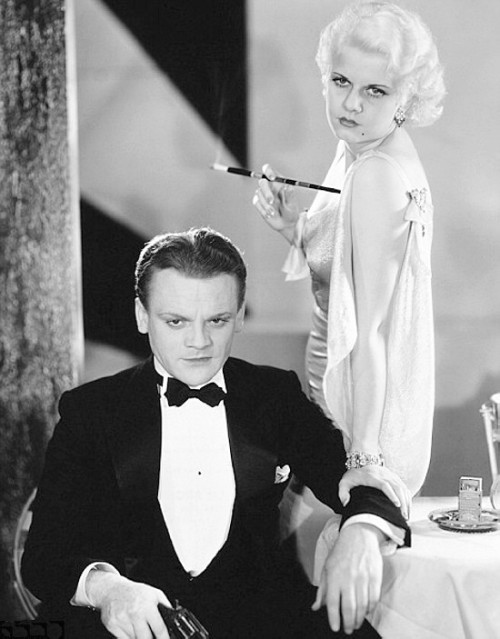
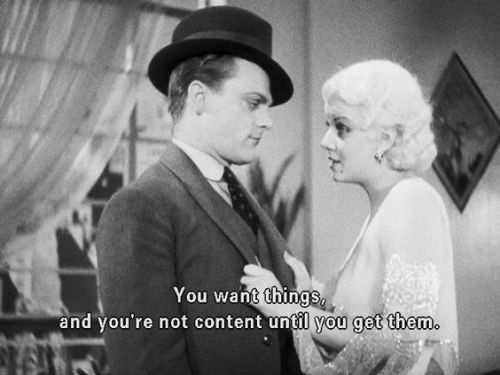
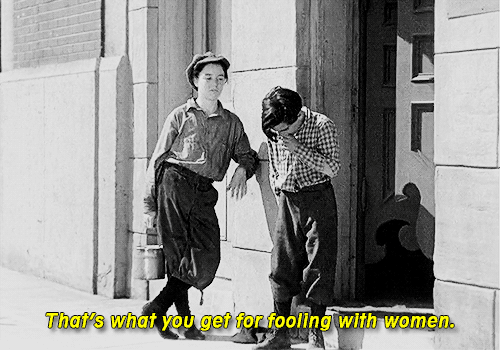

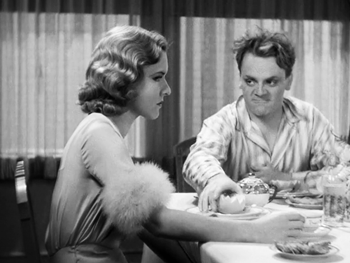

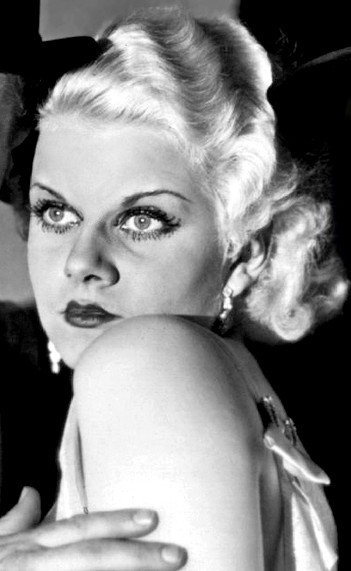
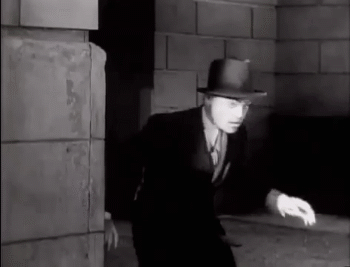

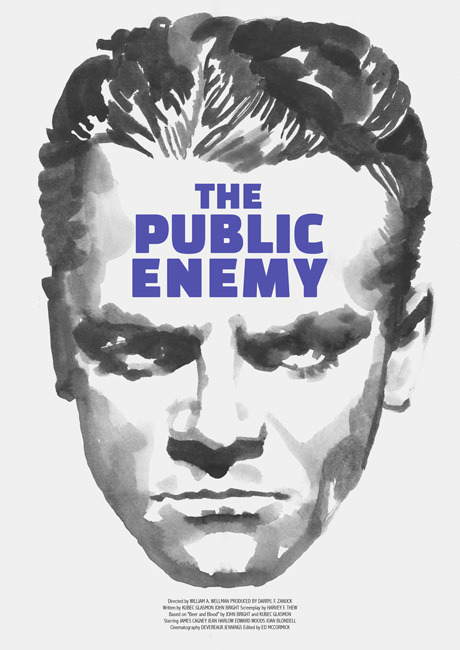

6 comments:
Oh my goodness - we are kindred spirits. I am decades older than you, my friend, but this, too was the film that changed my life and set me on the lover's lane to classic film. It was a Saturday afternoon and this aired on the local TV station (no cable or TCM back then). For me, Cagney is, was and will always be the greatest.
I agree – there is nothing primitive about this film. Everything is top notch, and it still captivates audiences today.
I'm so glad you were a rebellious teen and that your cookies didn't turn out as planned. Think of all these wonderful articles and the fabulous websites you produce! We would be missing out on all that. :)
Public Enemy is not my favorite Cagney movie but its up there in the top 5. Good review.
Ha! I love your closing paragraph. My introduction to classic films was nowhere near as interesting. Still, I'm thankful I found them.
I love this! What a great way to be introduced to classic film--by the great James Cagney himself. That is so cool. Thanks again for joining the blogathon, Le!
I've always admired The Public Enemy too--it's a powerful film that manages to be very adult and gritty without looking too gritty, if you get my drift. And all the performances are just marvelous. Cagney is an icon.
It's also admirable that it showed a WWI soldier suffering from PTSD. PTSD wasn't talked about as much in those days, so that was pretty brave.
I also wanted to invite you to the Fifth Annual Buster blogathon, which will take place Feb 18-19 2019. Would love to have you participate again, if you're able!
Post a Comment